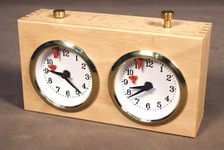
"Life is a series of choices and consequences. One makes the choice and lives with the consequences." William L. Jenkins
As much as I hate to start out this entry with a Bill Jenkins quote, there it is. It's true that life is filled with decision after decision. And every decision has a consequence, either intended or unintended. Sometimes, I wish there was a guaranteed result for every action, but then that wouldn't be life. Forest Gump's Mother was right, life is like "a box of chocolates. You never know what you are gonna to get."
So, I don't want to talk to you about consequences as much as I would like to discuss committing to a choice. Sometimes the fear of making the "wrong" decision can keep us from making any decisions at all. We may sit and ponder all the negative outcomes into infinity. This decision paralysis is worse that making a poor decision because it waste our most precious asset, time.
In Tournament Chess, we play with clocks. Each player usually has about 1 hour to complete their moves. Time Control was added to the game early in the game’s history to keep it from dragging on forever. There are more important things to do you know. Here's the point: In Chess, you can lose by being beat by an opponent or by running out of time. Trust me; you don't want to run out of time.
However, there is something worse than Decision Paralysis. That is Commitment Phobia. Have you ever known someone who repeatedly makes decisions and then ask, “can I take that back? That’s not really what I wanted to do.” This person finds it hard to make a decision and stick with it. They seem to find a better choice two seconds after they make one. For people like this, the “Touch Move Rule” was implemented. If you touch a piece in tournament play, you must move that piece. This rule forces commitment.
Here’s your lesson. Your life is on The Clock and I am implementing the Touch Move Rule to your day. You have exactly one life rotation to experience everything your mind can image. There’s not enough time to experience everything but you can try. Don’t waste too much time trying to figure out what the outcome will be of decisions today. It will be what it will be. Just understand that you can handle any of the consequences that arise.
Here’s the best part, you can’t lose. You have already won by engaging the process. The simple fact that you are making choices and experiencing consequences is a sign that you are living. That’s winning. If you make a choice you don’t like, make the best of it, and do it differently next time. Believe me, there will be a next time. Life has a wonderful way of giving us second chances. Besides, there’s always time for another game.
Coach Hodge
Your Chess and Life Coach
“If life’s not a game, why is everybody keeping score?”
As much as I hate to start out this entry with a Bill Jenkins quote, there it is. It's true that life is filled with decision after decision. And every decision has a consequence, either intended or unintended. Sometimes, I wish there was a guaranteed result for every action, but then that wouldn't be life. Forest Gump's Mother was right, life is like "a box of chocolates. You never know what you are gonna to get."
So, I don't want to talk to you about consequences as much as I would like to discuss committing to a choice. Sometimes the fear of making the "wrong" decision can keep us from making any decisions at all. We may sit and ponder all the negative outcomes into infinity. This decision paralysis is worse that making a poor decision because it waste our most precious asset, time.
In Tournament Chess, we play with clocks. Each player usually has about 1 hour to complete their moves. Time Control was added to the game early in the game’s history to keep it from dragging on forever. There are more important things to do you know. Here's the point: In Chess, you can lose by being beat by an opponent or by running out of time. Trust me; you don't want to run out of time.
However, there is something worse than Decision Paralysis. That is Commitment Phobia. Have you ever known someone who repeatedly makes decisions and then ask, “can I take that back? That’s not really what I wanted to do.” This person finds it hard to make a decision and stick with it. They seem to find a better choice two seconds after they make one. For people like this, the “Touch Move Rule” was implemented. If you touch a piece in tournament play, you must move that piece. This rule forces commitment.
Here’s your lesson. Your life is on The Clock and I am implementing the Touch Move Rule to your day. You have exactly one life rotation to experience everything your mind can image. There’s not enough time to experience everything but you can try. Don’t waste too much time trying to figure out what the outcome will be of decisions today. It will be what it will be. Just understand that you can handle any of the consequences that arise.
Here’s the best part, you can’t lose. You have already won by engaging the process. The simple fact that you are making choices and experiencing consequences is a sign that you are living. That’s winning. If you make a choice you don’t like, make the best of it, and do it differently next time. Believe me, there will be a next time. Life has a wonderful way of giving us second chances. Besides, there’s always time for another game.
Coach Hodge
Your Chess and Life Coach
“If life’s not a game, why is everybody keeping score?”
 RSS Feed
RSS Feed
